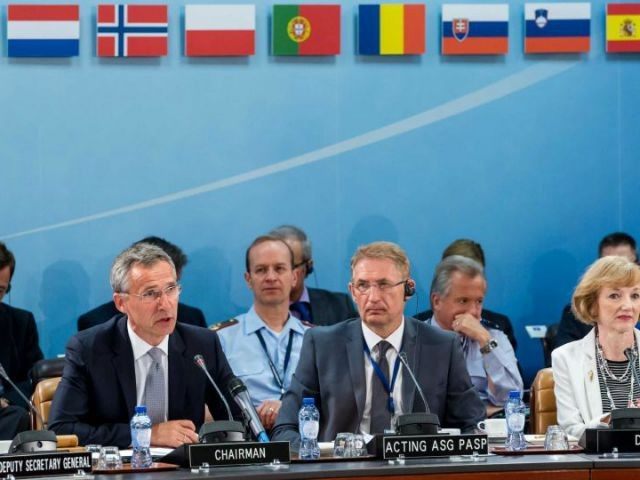The North Atlantic Treaty Organization (NATO) issued a statement in “strong solidarity” with Turkey following that nation’s emergency meeting to address a new anti-terrorism campaign against the Islamic State and the Kurdistan Workers’ Party (PKK), which has stretched out of Ankara as far as northern Iraq in less than a week.
“We strongly condemn the terrorist attacks against Turkey, and express our condolences to the Turkish government and the families of the victims in Suruç and other attacks against police and military officers,” the members of NATO said in a statement issued following a meeting of all NATO members Tuesday, convened through Turkey’s Article 4 powers. (Article 4 allows any NATO member nation to convene an emergency meeting when their territorial integrity is at stake.)
“Terrorism in all its forms and manifestations can never be tolerated or justified,” NATO continued in their statement, calling the union “indivisible” and vowing to remain “in strong solidarity with Turkey.”
There was little indication that the meeting would result in anything different. As the news broke Monday that Turkey had called for the meeting, NATO Secretary General Jens Stoltenberg issued a statement condemning the “heinous terrorist attacks” that had triggered Turkey’s military action, notably the suicide bombing in border town Suruç that left 32, mostly Kurds, dead last week. “NATO allies follow developments very closely and stand in solidarity with Turkey,” he said then.
The Telegraph describes the NATO meeting as “largely symbolic,” noting that the greatest impact it appears to be having is providing Turkey international legitimacy for its military action. Turkey has not asked NATO to provide military aid nor requested any NATO nation to join the fight–except for the United States, whose forces are now allowed to use Turkish airbases for airstrikes against the Islamic State in Syria. Without Turkey requesting direct NATO assistance, all the group can do is lend moral support.
While NATO has been steadfast in supporting Turkey’s anti-terror actions, individual members have called for Turkey to attempt to continue the peace process with the PKK, which ended abruptly with Turkey’s airstrike campaign. “Reconciliation should continue,” said Dutch NATO representative Marjanne de Kwaasteniet. Turkish President Recep Tayyip Erdogan has made clear he has no intention of continuing any reconciliation process, saying this week that any peace talks with the PKK were “impossible.”
What Turkey initially announced as a small campaign to create an “ISIS-free zone” in Syria changed focus rapidly to the PKK, a longtime major foe of the Turkish government. Turkey began airstrikes far from the Syrian ISIS zone Tuesday, targeting PKK positions in northern Iraq. While the Kurdish government of Iraq under President Masoud Barzani has issued statements apparently in support of operations against the PKK generally, Iraqi Prime Minister Haider al-Abadi condemned the attacks as a violation of Iraq’s sovereignty and “dangerous escalation” of violence. The Shiite-led Iraqi government in Baghdadi and the Kurdistan Regional Government headquartered in Erbil are often at odds, as the United States refuses to arm Kurdish forces while providing for the Iraqi government, which has proven tremendously inadequate in combatting the Islamic State compared to the Kurdish Peshmerga.

COMMENTS
Please let us know if you're having issues with commenting.